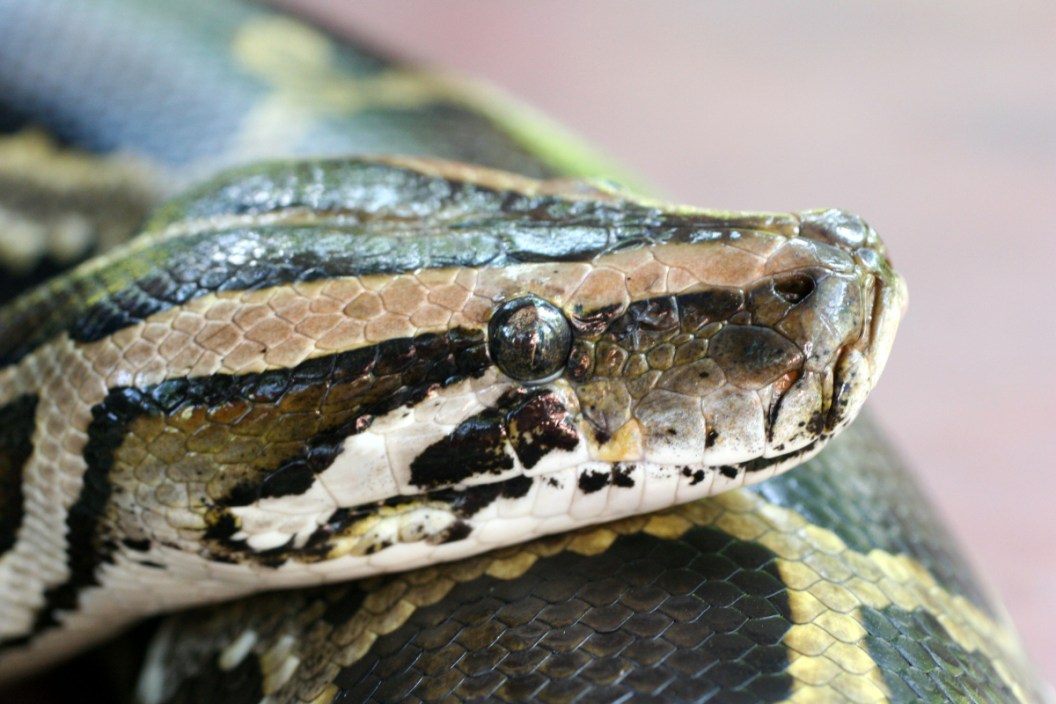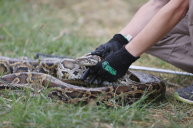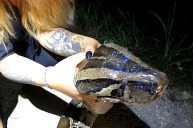Are Florida's Burmese pythons safe to eat?
That's the question at the forefront of many minds at the Florida Fish and Wildlife Conservation Commission. Mainly because officials see it as another way to encourage people to hunt the invasive species that are wreaking destruction across South Florida, especially in the famed wetlands of Everglades National Park.
The big constrictors are a huge concern for FWC officials because the animals wreak havoc on the native ecosystem by killing and eating native wildlife like raccoons, native snakes, bobcats, marsh rabbits, opossums, and more. Even apex predators like alligators are not safe and sightings of the snakes continue to increase. Now, according to the South Florida Sun Sentinel, the FWC will work with the Florida Department of Health to do tissue samples on these invasive snakes to determine if they are safe for human consumption.
The big concern is that previous studies have shown invasive Burmese pythons to carry large amounts of mercury in their systems. Florida Gulf Coast University professor Darren Rumbold told the Sun Sentinel one of their initial studies showed some pythons taken from the Everglades had a mercury level of 100 parts per million or more. The concern becomes obvious when the Environmental Protection Agency and Food and Drug Administration say a safe mercury level is just 0.3 parts per million. Most of it coming from heavy rainfall bringing air pollutants to the ground.
"We have one of the worst mercury problems in the world in the Everglades and South Florida," Rumbold said.
However, a more recent study of southwest Florida pythons found snakes with a much lower concentration of mercury. The hope is that the new studies will confirm these findings. This would give the FWC yet another way to bring on more snake hunters.
"We would like to use consumption as another way to encourage people to remove pythons in Florida if the meat is safe to eat," FWC spokesperson Carli Segelson told the Sun Sentinel. "The study will help ensure that is safe."
The FWC already encourages python removal through their annual "Florida Python Challenge," which tasks residents with bagging the largest snakes possible for cash prizes. The state also contracts full-time python hunters who for their python elimination program. These men and women spend countless hours scouring the wetlands for these invasive creatures.
Earlier this year, one of these contracted hunters caught a massive 18.9-footer in the Everglades Ecosystem. The snake weighed 104 pounds and is the largest caught since the program began. Florida officials believe Burmese pythons, which are originally native to southeast Asia, first arrived in the Everglades as escapes or animals released from the exotic pet trade.
Unfortunately, Florida proved to be the perfect environment for the large reptiles and officials estimate there are tens of thousands of snakes at a minimum, creating quite the challenge not just for the FWC, but also the National Park Service and the U.S. Fish and Wildlife Service. The Sun Sentinel reports if the study finds pythons are safe to eat, they will likely develop some safety guidelines to help hunters prep the meat of these big reptiles.
For more outdoor content from Travis Smola, be sure to follow him on Twitter and check out his Geocaching and Outdoors with Travis YouTube channels.
NEXT: THE AXIS DEER AND HOW THEY'RE IMPACTING PARTS OF THE UNITED STATES
WATCH





